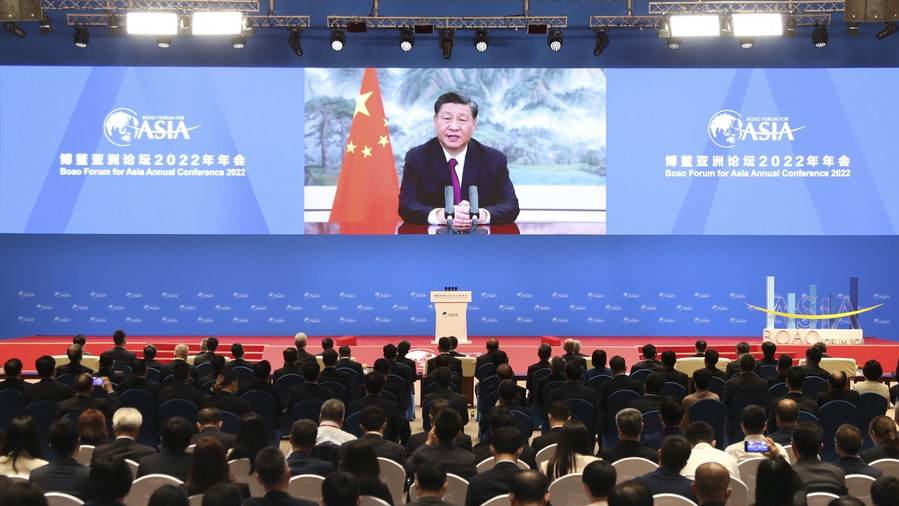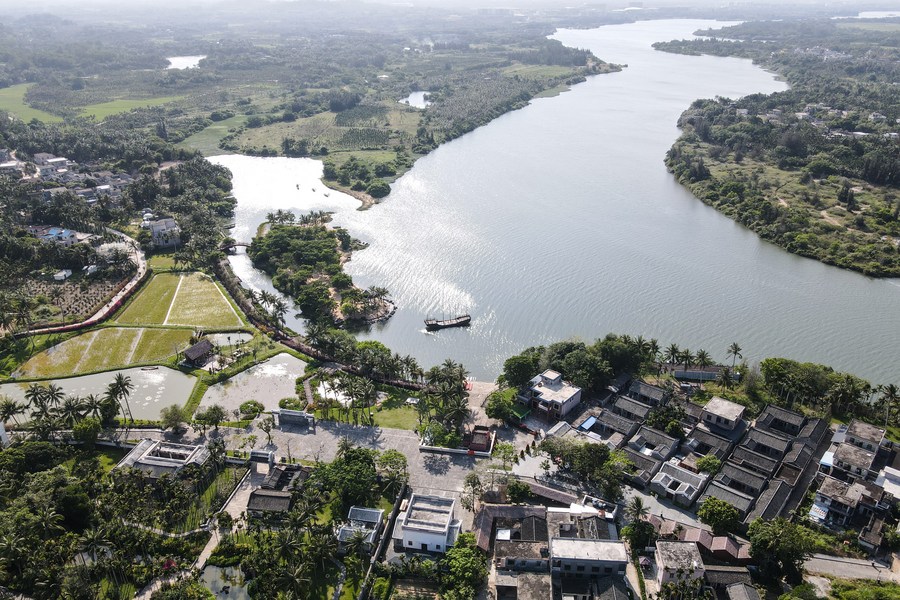
Chinese President Xi Jinping delivers a keynote speech via video at the opening ceremony of the Boao Forum for Asia Annual Conference 2022, April 21, 2022. /Xinhua
Chinese President Xi Jinping delivers a keynote speech via video at the opening ceremony of the Boao Forum for Asia Annual Conference 2022, April 21, 2022. /Xinhua
Editor's note: Bradley Blankenship is a Prague-based American journalist, political analyst and freelance reporter. The article reflects the author's opinions and not necessarily the views of CGTN.
The annual conference of Boao Forum for Asia (BFA), which concluded in southern China on Friday, focused on the post-COVID-19 world, especially green recovery and sustainable development.
All of these are of particular importance for Asia. A once-in-a-century pandemic has severely impacted many countries' ability to reach their development goals, as have climate change and emerging security threats around the world.
Despite these challenges, there are some opportunities. President Xi Jinping touched on some of these in his keynote speech delivered via video from Beijing on April 21. His main points were working together to address the pandemic, supporting people-centered global development, and facilitating peace around the world while addressing global governance challenges.
Xi said be it delivering vaccines abroad or producing them overseas, China has honored its commitments with concrete actions. It has sent out over 2.1 billion vaccine doses to more than 120 countries and international organizations. To support inclusive development, last year he put forward the Global Development Initiative, which advocates cooperation in a wide range of areas, from poverty alleviation and ensuring food security to COVID-19 response and vaccines, and climate change and connectivity.
And on Thursday, he also proposed a new concept for peace and resolving governance of global challenges – a Global Security Initiative (GSI). While the full details are yet to be unveiled, his explanation at BFA suggests that it essentially hinges on multilateralism and adherence to fundamental international law, such as non-interference and diplomacy-first conflict resolution.
This is clearly relevant to the conflict in Ukraine, which is seeing a bloc of countries attempt to control the international reaction while implementing policies that are divisive, generally counterproductive and impeding global development.
Asia could be a shining example of this initiative – not only because of its relative stability in the world but also its importance as a burgeoning global commerce center. The eastward drift of global finance means that Asia's geopolitical importance cannot be understated, just like its continued prosperity and security.
Attempts to militarize the Asia-Pacific region by outside powers, such as the United States or the North Atlantic Treaty Organization (NATO), must be rejected or at least mitigated through close dialogue and cooperation between Asian countries. Countries should work together directly to avoid security dilemmas to ensure stability, regionally and globally.

Liuke Village in Boao, south China's Hainan Province, April 8, 2022. /Xinhua
Liuke Village in Boao, south China's Hainan Province, April 8, 2022. /Xinhua
China serves as a reliable partner in Asian security. The notion of a Pax Sinica, which originally refers to the peace in the Eastern world during the rule of the Han Dynasty (206 BC-AD 220), has become more relevant in the past decade.
The Sinocentric system of Asia has resulted in a peace totaling two millennia, according to author Sergey Smolnikov. Essentially, China doesn't invade or colonize its neighbors – and the result of this has been trust and security.
This directly ties into each country's economic well-being and recovery from the COVID-19 pandemic. The Regional Comprehensive Economic Partnership (RCEP), which is the world's largest free trade zone and came into effect this year, encompasses about a third of the world's population and 30 percent of the global GDP. Friendly neighborhood relations ensure that the RCEP can function unimpededly and benefit each of its member states.
As a major beneficiary of globalization, Asia stands to benefit from the GSI as well. Again, the conflict in Ukraine and the attendant sanctions against Russia serve as a case in point. The fact that a country as important to the global supply chain as Russia could be sanctioned to the extent that could even be described as "de-globalization" sets a bad precedent. It suggests that the same tactics of a handful of countries could be used against others.
This is not only futile since the attempts to de-globalize Russia have so far failed but inherently destructive. As Xi said, "Countries around the world are like passengers aboard the same ship who share the same destiny. For the ship to navigate the storm and sail toward a bright future, all passengers must pull together. The thought of throwing anyone overboard is simply not acceptable."
The sanctions on Russia have hurt not only the average Russian but also the most vulnerable in countries which are applying the sanctions as well as third parties with no involvement in the conflict.
Asian countries should join forces to ensure that such security breakdowns do not happen in their region. And Asia's growing economic importance means this will set a sweeping global precedent.
(If you want to contribute and have specific expertise, please contact us at opinions@cgtn.com. Follow @thouse_opinions on Twitter to discover the latest commentaries on CGTN Opinion Section.)

